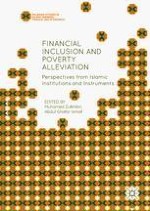2017 | OriginalPaper | Chapter
5. Application of Zakat to Food Security in the Context of Low-Income Rural Areas in Bangladesh: A Conceptual Model
Author : Ishrat Hossain
Published in: Financial Inclusion and Poverty Alleviation
Publisher: Springer International Publishing
Activate our intelligent search to find suitable subject content or patents.
Select sections of text to find matching patents with Artificial Intelligence. powered by
Select sections of text to find additional relevant content using AI-assisted search. powered by
